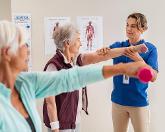see all jobs
WHO report shows increasing activity levels could save Europe €14bn in health costs by 2050
Almost half of the population of the EU don't exercise or play sport and the impact of this on healthcare services is costing billions, according to a new report.
Step up! Tackling the burden of insufficient physical activity in Europe, from the World Health Organization (WHO) and OECD – with support from the EU – links this lack of physical activity to health decline and economic impact.
It calls on policymakers to step up their policy response to increase physical activity and makes a clear case for why meeting more than the minimum targets would be an effective disease prevention tool carrying a greater health and cost impact.
WHO recommends at least 150 minutes of moderate-intensity exercise each week. According to the report, increasing to this level would prevent 11.5m new cases of noncommunicable diseases (NCDs) by 2050. This includes 3.8m cases of cardiovascular diseases, 3.5m cases of depression, nearly 1m cases of type 2 diabetes and more than 400,000 cases of different cancers.
Raising to minimum levels would also save EU member states 0.6 per cent of their health care budget, on average, a total of nearly €8bn PPP per year. PPP means purchasing power parities – defined as “the rates of currency conversion that try to equalise the purchasing power of different currencies, by eliminating the differences in price levels between countries”.
The report further explains that Germany, Italy and France – which have the greatest healthcare burden from inactivity – will pay out €2bn PPP, €1.3bn PPP and €1bn PPP, respectively, to treat diseases that are caused through a lack of exercise each year between 2022 and 2050.
Citizens engaging in 300 minutes of physical activity per week would prevent a further 16m cases of NCDs.
“Regular physical activity is one of the most important things people can do for a healthy life – not only does it significantly reduce the risk of numerous noncommunicable diseases, but it also improves mental health and increases well-being,” said Dr Kremlin Wickramasinghe, ad interim head of the WHO European Office for the Prevention and Control of Noncommunicable Diseases.
“WHO recommends at least 150 minutes of moderate intensity physical activity per week and every move counts towards better health. Our latest report shows that if everyone in the EU were to meet WHO recommended levels of physical activity, it could prevent more than 10,000 premature deaths each year.”
Breakdown of most vulnerable
The report highlights the three risk factors that increase the risk of chronic diseases: low physical activity, low cardiovascular fitness and sedentary behaviour (such as having a desk job, driving a car or watching TV).
It also provides a breakdown of the most vulnerable demographics and gender differences: only one in five boys compared with one in ten girls meet the WHO recommendations. Out of 17-24 year olds, 73 per cent of men compared with 58 per cent of women meet moderate activity guidelines.
Children and teenagers (age 5-17) should do at least an average of 60 minutes every day of mostly aerobic physical activity. Inactivity is prevalent in adolescents, with less than one in five (17.6 per cent) boys and one in ten (9.6 per cent) girls across the 27 EU member states meeting recommendations in 2018. Adolescents in Italy, France and Portugal engage in the least amount of physical activity.
The report exposes inequalities that exist among socio-economic groups, such as: 24 per cent who consider themselves working class exercise regularly compared with over 51 per cent of upper class.
Policies to up activity and reduce health budget burden
Overall, the report comprises four parts: why physical activity is important; trends and patterns in Europe; the burden of insufficient inactivity; and policy options to increase physical activity. This final section includes examples of schemes that are running in various member states across the EU, which aim to increase the population’s levels of physical activity.
Sports facilities, environmental policies, increased public spending, design and transport policies can all influence health, physical activity and economic outcomes for countries.
It states how previous OECD modelling work showed how physical activity policy packages, including interventions such as prescribing physical activity, investing in active transport and school-based programmes, could lead to significant health gains and savings in health care expenditure.
Implementing such policies make a difference, but are lacking. Wickramasinghe points out that, for example, schemes promoting active travel to school or work are only present in 14 and 17 out of 27 EU member states, respectively.
“Such a package of policies aimed at increasing physical activity, implemented in 36 countries, would prevent 38,000 NCDs per year and save around €14bn in health costs by 2050 – equivalent to the total annual health care expenditure of Greece,” stated the report. “Moreover, for every €1 invested in a physical activity policy package, €1.7 are returned in economic benefits (OECD, 2019[20]).”
Click here to read the full report: www.hcmmag.com/WHO-OECD-StepUpReport2023
More News
- News by sector (all)
- All news
- Fitness
- Personal trainer
- Sport
- Spa
- Swimming
- Hospitality
- Entertainment & Gaming
- Commercial Leisure
- Property
- Architecture
- Design
- Tourism
- Travel
- Attractions
- Theme & Water Parks
- Arts & Culture
- Heritage & Museums
- Parks & Countryside
- Sales & Marketing
- Public Sector
- Training
- People
- Executive
- Apprenticeships
- Suppliers





















































